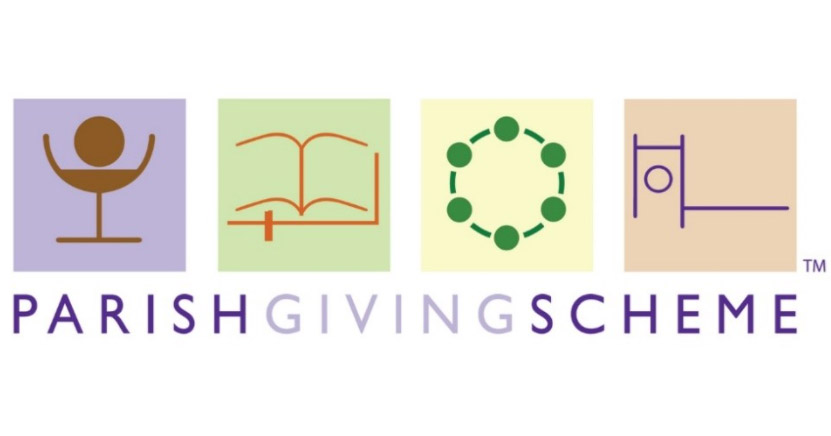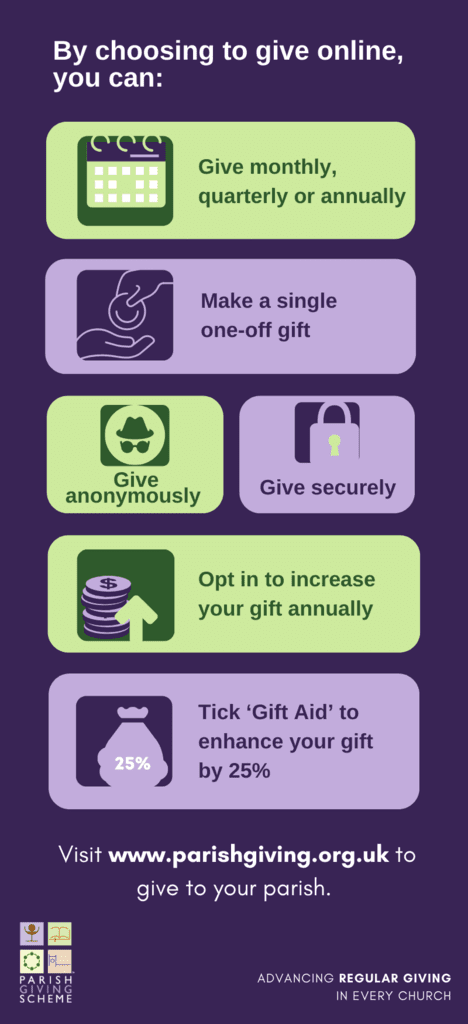Parish Giving Scheme

What is the Parish Giving Scheme?
The Parish Giving Scheme is a new, free way to help you plan your giving and, if you are a taxpayer, to do so tax efficiently. Whether you currently give by Standing Order, the envelope scheme or by occasional donation, you can easily make the switch to this secure and efficient Direct Debit system.
Tried, tested and highly recommended by over 40,000 people in nearly thirty dioceses for its reliability and ease of use, the Parish Giving Scheme can help you give to your church in an easy, straight forward way.
How does the scheme work?
You give your regular donations for St Paul’s or St Nicholas to the Parish Giving Scheme by Direct Debit on a monthly basis on the 1st of the month. Your full gift and any associated Gift Aid are automatically credited to the church by the Parish Giving Scheme in the same month. You can choose to inflation-proof your gift which will really help our finances. You can even give anonymously, if you wish. If you would prefer to give with a different frequency, please contact the Treasurer in the first instance. You can change or cancel the amount at any time by a simple phone call or email to the Parish Giving Scheme team.
Why does inflation matter?
| Year | 2004 | 2009 | 2014 | 2019 |
| Gift | £20.00 | £17.47 | £14.59 | £12.93 |
Our church, like every household, faces increasing costs every year. If your giving does not keep pace with the increasing costs then, over time, it can lose its financial value. This illustration shows how much a donation falls in value if it does not change with inflation.
The Parish Giving Scheme tackles this by enabling you to choose to increase your giving annually in line with inflation. You simply tick the relevant box on the gift form to authorise an inflationary increase.
If you choose an inflationary increase the Parish Giving Scheme will send you a letter before it increases, and if you do not want it to increase then you simply call them to ask for it not to take place. So far, nearly two-thirds of givers across the participating dioceses have opted to increase their gift annually in line with inflation.
Why give in a new way?
The Church of England has a Christian presence in every community, seeking to be at the heart of all our cities, towns and villages. We serve our community by sharing our faith and values, worshipping together, and by our wonderful buildings. This valuable contribution to our community comes at a cost, which is largely met by personal gifts from you and other church members.
For us to grow and fulfil the vision we have for the future, we need to increase our giving, and have more people giving regularly. Money often dominates too many agendas in the church and takes up a lot of volunteers’ time in counting the money, administration and claiming Gift Aid. If you sign up to the Parish Giving Scheme, more of your money and our time can be devoted to God’s mission.
How Much Should I Give?
Giving by individuals is essential to secure our ability to serve its community and for the Church of England to minister across the country. How much you give is a matter for your personal and prayerful reflection.
Everything comes from you, and we have given you only what comes from your hand.
1 Chronicles 29:14
Our giving should reflect not only our willingness to give, but also our ability to give; since individual circumstances differ significantly, so will our individual gifts. A starting point when reflecting on our Christian giving is that when giving to others, we should give in proportion to what we ourselves receive from God i.e. in proportion to our income. This practice of tithing has Biblical origins and the “tithe” literally means a tenth.
For some time, the Church of England General Synod has encouraged us as Christians to review our giving annually and to give a proportion of our income. The initial target suggested by General Synod is 5% of post-tax income to and through the church and a similar amount to other kingdom building charities.
You can choose to calculate your proportionate giving on pre-tax, post-tax or disposable income but do whatever feels right for you.
Each person should give what they have decided in their heart to give, not reluctantly or under compulsion, for God loves a cheerful giver. (2 Corinthians 9:7)
What Happens Next?
St Paul’s and St Nicholas has already signed up to the Parish Giving Scheme. All you need to do is to either fill in a form online or complete and send a Gift Form:
Online
Online registration and form can be found here: Wokingham S Paul w S Nicholas – Parish Giving Scheme
Gift Form
The gift form can be downloaded here
and is also available from Lesley Ruddock, or Lyn Austen. You will need to tick the necessary box on the Gift Form to select an inflationary increase if you wish to do this.
Send the Gift Form direct to: Parish Giving Scheme, 76 Kingsholm Road, Gloucester, GL1 3BD. Keep the PGS Information pages (1-2) which you were also given, as these explain what will happen next.
Cancel Standing Order
Finally, if you currently give by Standing Order, you will need to cancel it with your bank. We recommend waiting until you’ve received your welcome letter from PGS before cancelling the standing order.
Everyone benefits with the Parish Giving Scheme
You are in total control of the amount you give.
The Direct Debit guarantee means your gift is secure and safe.
You can choose to increase your gift annually by inflation if you wish.
Gift Aid is automatically claimed for the church every month, and this means reduced administration, less work for your treasurer and Gift Aid secretary and better cashflow.
Questions?
If you have any further questions, please contact Lesley Ruddock or Lyn Austen or the Parish Giving Scheme administrator for the Oxford diocese (generosity@oxford.anglican.org).
You can download the information sheet:
Alternatively, you can visit our web page www.oxford.anglican.org/support-services/parish-support/generous-giving/parish-giving-scheme/ where you can find more information, including two short films about PGS and an FAQs section.

